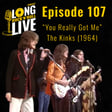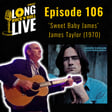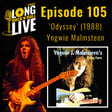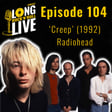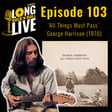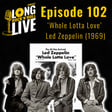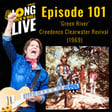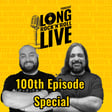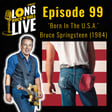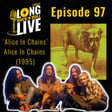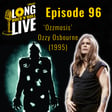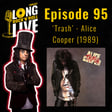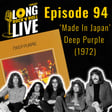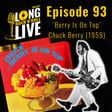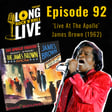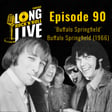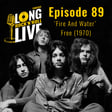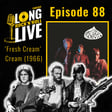Become a Creator today!Start creating today - Share your story with the world!
Start for free
00:00:00
00:00:01

83. Jerry Lee Lewis
Jerry Lee Lewis revolutionised Rock 'n' Roll. He made the piano a lead instrument, fused genres, delivered high-energy performances and defied social norms with his image. Having influenced future artists and genres to such an extent, we take a look at his iconic ‘Great Balls Of Fire’ and a handful of his other hits which undoubtedly helped shape, innovate and pioneer the rebellious spirit of Rock 'n' Roll.
Episode Playlist: https://open.spotify.com/playlist/7BdnSIAA3E8NlHdUolxYmh?si=054602a14d82470e
#JerryLeeLewis #GreatBallsOfFire #RockNRoll
Transcript
00:00:00
Speaker
Hello and welcome back to the Long Live Rock and Roll Podcast. Jerry Lee Lewis revolutionised rock and roll. He made the piano a lead instrument, fused genres, delivered high-energy performances and defied social norms with his image. Having influenced future artists and genres to such an extent, we take a look at his iconic Great Balls of Fire and a handful of his other hits which undoubtedly helped shape, innovate and pioneer the rebellious spirit of rock and roll.
00:00:28
Speaker
Joining me to discuss Jerry Lee Lewis is my co-host Mr Felipe Amorim. How you doing, bro? Great man. I hope you find you. Yeah, good. Thank you. Welcome back everyone. For new listeners or viewers, please the terms and conditions as we like to call them. If you're on YouTube, make sure you give us a like and subscribe. So you stay up to date with our content. And if you're listening on Apple or Spotify, whether you're new or an old listener, I don't mean age. I mean, in terms of how long you've been listening to us, make sure you scroll down and give us a little review. Anything 20 seconds of your time really helps us out. A good review sends us straight up the charts and gets to us to be seen by more people. So we'd really appreciate it.
00:01:04
Speaker
Anyway, Jerry Lee Lewis. Yes. You watched the biopic, didn't you? It's not biopic, it's actually a movie, isn't it? It's a movie, it's a Hollywood movie, a proper one, like Great Balls of Fire. I think it wasn't like a hit when it was released, ah but it's a well done movie. ah Dennis Quaid plays Jerry Lee Lewis and he does a phenomenal job.
00:01:25
Speaker
ah generally liu was like didn't like the movie but liked him ah that's always a good sign and yeah exactly and so even if the movie was directed badly you got me right. exactly of course, he wouldn't like the movie doesn't it doesn't show him as as a nice person. and Right. So ah the the other thing is, ah ah he rerecorded the tracks for the movie. So it's like, ah ah so all his hits, you can find the original versions on Spotify and whatever platform you're using. But you can also find a 1989 record re recordings by Jerry Lewis himself. And it's it's they're really good, actually. And we'll just touch on that for a second, because if you whether ah you're on YouTube, Spotify or Apple, if you go down into the show notes, you'll see an episode playlist, which we create each week for a new episode. And it has all the songs we mentioned, you know, this is an artist episode, but if we do an album, it'll have all the songs from an album plus any we mentioned.
00:02:18
Speaker
Now, because we're doing a kind of overview of Jerry Lee Lewis, a little look and dive into his career, we've actually put in the soundtrack for the movie because it contains most of his hits. Now, although these are re-recorded, you're going to see the soundtrack for the movie, all the songs he wrote, all of his hits that were re-recorded for the movie. And on top of that, I've put the originals below.
00:02:37
Speaker
So all the songs are going to talk about the characteristics, the stylistic you know genres are in it that will all be in the playlist for you to listen to along with this podcast. So um just kick off with a little bit of background about Jerry Lee Lewis. He was born late September in 1935 in Faraday, Louisiana, and died at a decent age of 87 at the end of October, 2022. I actually remember when he died and the news came out. Gee, a couple of years ago. He began playing piano at a very young age, which is Quite funny, isn't it? Because that's what we've always seen with these rock and roll pioneers. Fats Domino, you know, um Elvis, Buddy. Oh God, I've forgotten. it Oh my God, Chuck Berry. How did I forget that? Chuck Berry with a guitar at a young age. It shows that their influence comes early, doesn't it?
00:03:24
Speaker
Yeah. And especially, you know, Jerry Lee Lewis, he was influenced through the radio. His family enjoyed music and he went to quite a lot of local music venues. um His first public performance was in 1949. And he's actually got a couple of famous family members, maybe not for the right reasons, especially this TV evangelist. All right. Jimmy Swaggart is, I believe it's an uncle of his, um who was a TV evangelist. And Mickey Gilly was a country singer. All right.
00:03:51
Speaker
So he's got a bit of a musical family with a famous family. yeah ah But this is a really funny story that before we move on to his career, I want to tell you this. Did you know that his mother enrolled him into a Bible Institute in Texas? I would imagine so. I didn't know it was exactly that. He was enrolled in a Bible Institute, but they kicked him out because when they were doing the songs, they did the song My God is Real and he did a boogie woogie version of it.
00:04:17
Speaker
And they kicked him out. They're like, there own ain't no place for this boogie woogie in this institute. um Sorry for that poor Texan accent. Well, if you watch the movie, there's a lot of his ah ah kind of conflicts with his cousin, because they like they were like, at least in the movie, their portrait as almost like brothers, they grew up together. And his cousin was going down the path of the church and all this stuff. And he was playing rock and roll. And his cousin was always telling him, that's the, you know, the devil's music. You shouldn't play that. You shouldn't be doing this. There you go. Well, just ah three more dates. 1952, we got the first ever Jerry Lee Lewis demo. 1956, he went to Nashville to audition for Sun Studios, where we know, you know, that's where Elvis was essentially born. And 1957, we got Great Balls of Fire. So I think because of the nature of this episode, that's where we're going to have to start. Let's talk about Great Balls of Fire, man. You kick off. What a song, right? That that song has got um every single
00:05:17
Speaker
are essential. I don't know, characteristics of his playing and his singing. So that is Jerry Lee Lewis in a nutshell. He recorded songs by loads of different songwriters and he record recorded, re-recorded songs that were already classics, but that's his own classic. That's his number one hit. That is the ah the song that knocked Elvis to second place, you know, down to second place on the charts. So that is that is, that's a hell of an achievement, isn't it?
00:05:47
Speaker
It is. Yeah. I mean, the the thing that stands out to me and I think to most people straight away is the piano and the use of a piano in this song yeah because it was so different for the time. that the The piano was a background instrument in in the fifties, you know, where the vocals were the primary. I mean, I suppose the vocals still are the primary thing here. but Rock and roll was very guitar driven. It wasn't in the early fifties. You know, they're just learning to use the electric guitar and just sort of really it scaring being a bit rebellious with this electric guitar twangy sound coming through an amp. For Jerry Lewis to just sort of out of nowhere say, well, actually, I don't play the guitar. I play the piano. And here's what I'm going to give you.
00:06:22
Speaker
Yeah, exactly. And also, yeah, yeah. um Also, apparently the labels were looking for more guitar players or so people who could sing and play guitar. So you have Elvis playing the acoustic guitar, you have Jack Barry playing those amazing solos with an electric guitar. And then Charlie Lewis comes with his piano. but playing almost like he's in like a Eddie Van Halen of the piano, isn't it? It's like it's like it's the thing with his piano playing is it's it's not how can I put it? It's not clean. It's not nice. It's not like it's it's chaotic. It's wild and it's completely over the top. Aggressive. But it works. Yeah. I mean, it was a completely innovative approach to it. was yeah you know driving that The piano was the driving force of the song, although you had the kind of rhythm section in the bass.
00:07:10
Speaker
and occasionally some drums in his other work. The piano was the driving factor, creating an energetic sound. Yeah, I would say, although the solos are amazing and everything, but his left hand, the bass lines he does on the piano, are so strong and like and so important to the groove in the song. Yeah, for sure. And it's really cool. yeah I love the, for the version, I mean, there's many versions of this song and the one I've listened to that is in the playlist, not the one from the soundtrack, but the other one. The solo at the end, I call it a solo, it's just one note.
00:07:41
Speaker
It's just hammering that one. It just goes on. But I don't want it to stop. I don't want it to stop. I'm like, please give me more of that. But yeah, complimenting that incredible, incredibly innovative and aggressive piano. We have his vocals, which kind of almost do the same thing, don't they? It's a bit, it's very wild. It's quite breathy. It's very intense. And it matches the passion that you hear A in the lyrics and B in the piano.
00:08:08
Speaker
Yeah, exactly. I think there's a nice conversation between his vocals and the piano, isn't there? If you listen to another two of his songs, I think it's I'm on Fire and Breathless, they use the same formula as Great Balls on Fire.
00:08:25
Speaker
It's the same the same sort of like ah uptempo rock groove and with stops before the the the main line of the chorus and that kind of stuff. ah But he was really, really good at using that formula and creating on top of that. and ah yeah But the vocals are essential. So he wouldn't be that famous if it was just for his piano playing. I think that his vocals are quite recognizable as well, isn't it? So he was clearly also not trying to sound like anyone else. That's the other thing.
00:08:54
Speaker
ah Yeah, and and he just has this freedom with it, doesn't he, where, you know, I've got in my notes here funny voices, but I'm talking about those moments where he's like, you know, kiss me, baby, it feels good. Just playing around, he's having fun. And this is what rock and roll was about, wasn't it? it was about yeah It was about changing the norms, not doing something that was so normal before. You know, when you think about pop music in the 40s and 50s, you think of sort of show music, musical theatre, show music that was on Broadway, and you have a very kind so again, I'm generalizing here, but you'd have a very conservative singer, probably singing very conservative lyrics as well in a very normal, and I don't want to go as far as saying like operatic way, but it would be very controlled, nice notes, nice melodies. Then you've got Jerry Lee Lewis coming here. You know, we mentioned it in the Elvis episode with some of his ah vocal ways, like, you know, I want to see, you know, you can do it like that.
00:09:47
Speaker
This is a bit different because Elvis was kind of, it was more of a rhythmic thing. This is just a guy going off on one and doing whatever he wants, whatever he thinks the song needs. um yeah Yeah, it sounds like he would go into a recording session and and play as if he's playing in his living room. You know, so it's just like, yeah, I just want to, you know, mess about with the lyrics and and the melody. and And he laughs sometimes in a bit of the melody. yeah There's a version, I think it's his first recording of ah a Big Leg Woman,
00:10:14
Speaker
I don't want to get older than any of the song titles wrong. ah But it's ah it's ah it's in the movie, it's a famous song, but it is his original recording for Sun. um or some records was um he he just he's just like clearly ah interacting with his own piano is like having fun with himself you know like plays a phrase on the piano and kind of does the same with the vocals and he's almost like laughing as he sings the lyrics it's not taking him himself very seriously there and it's super fun to listen to through all these songs there's shouting there's laughing there's growling like he just does it all he's just having fun and i think that's what's really important and probably quite innovative because although we like i said we heard those vocal things Elvis did it little Richard as well changed his voice depending on what the song needed there was still an element of i'm gonna say
00:11:09
Speaker
seriousness there it feels like although they were messing about a bit in terms of vocal flexions and this and that they still had to deliver the melody and that's because probably they were writing they were recording songs for their labels and for studios yeah and obviously Jerry Lee Lewis might have been doing the same but I just love that I'd love to think that they're in the studio and whoever the producer is just goes Jerry do what the hell you want man because because what we know what you're good at and if you record it and execute it well it's going to sell and it did exactly And it did multiple times. Yeah, yeah, exactly. and Yeah, as I said, this is a very, yeah, my notes, I got departure from more polished and restrained pop performances of the era, which, as I was saying, the move from 40s and to early 50s pop into this rebellious and crazy rock and roll brings us to where we are with his vocals. Now, the other thing we talk about, especially in this song, um is the lyrics, because this, again, was a very innovative and unusual lyrical style, very sexual,
00:12:08
Speaker
very um rebellious, you know, this is not one this is not what parents of the 50s wanted their teenage kids listening to, especially back then in such a conservative time. It does remind me of Little Richard in that sense, isn't it? the li yeah Although I feel that this is a bit more explicit than Little Richard, to a degree. Yeah, definitely. ah Yeah. um As I said, yeah, kind controversial at the time. But this, the explicitness We have to look back at this as the moat was not as one of the moments. The revolutionized early rock and roll. Yeah, because this is what this is what rock for those who don't know, this is what rock and roll means. Rock and roll literally means sex, rocking and rolling in a bed on a sofa, whatever. Yes, that's that's where the. And he wasn't trying to. Yeah, he wasn't trying to avoid this, you know, the, you know, talking about this sort of stuff. And
00:13:01
Speaker
it also the fact he he would call himself the wild one, you know, is is is wild. he' he He wanted to be the king of rock and roll. He wanted to be bigger than Elvis and his performance is all about that. It's funny because when we think about like um any music from that time, you you tend to think of the way you look at the way people dressed at the time, you would imagine a certain behavior like kind of ah attached to that image. yeah And it doesn't happen with him. I think he was almost like a Jimi Hendrix on stage. And although he never set fire on the piano, like happens in a movie. And a people pivot to yeah I don't think it's even possible to set fire on the piano and keep playing. um But um
00:13:43
Speaker
But ah he was kind of like really close to that sort of Jimi Hendrix attitude on stage. yeah But you wouldn't imagine you we see those things with guitarists, right? All the time, like breaking guitars ah or jumping and doing all this stuff. You would imagine that someone who sits in front of his ah piano is like, you're restricted to that. like that you know the The piano is almost like ah an obstacle between you and and and your audience. And its and he performs it away. Yeah, that's a great point. Yeah, you know, it's like it's not it's not like a guitar can walk around on stage with it. And he could perform with his piano as if he was a heavy metal guitar player. Well, that's a great point. And I would go as far as to say that probably Little Richard and you Richard Jerry lee Lewis is is one of the reasons.
00:14:28
Speaker
that we saw um The Who smashing up the good bad guitars on stage, you know, um Keith Moon kicking his kit, you know, this is where because it's rock and roll. And although The Who were like, well, actually, you know, we're thinking about The Who were only sort of 10 or 15 years after this.
00:14:44
Speaker
you can see exactly where they got this out. They they must have looked at Jerry Lee Lewis and gone, my God, this guy thinks he can do what he wants. And he can. And he can, so we can do it as well. This and this is what we're going to bring to our music. We're going to take that that base of the blues and we're going to add distorted guitars, add a bit of raucousness, add some shouting and transform into that rock and roll.
00:15:05
Speaker
Yeah, I think a proper rock and roll performer would always get some sort of reaction from the audience. And it it might be because the music is amazing, but sometimes it's just because it's shocking in a certain way. And to quote Spinal Tap again, ah rock and roll should change your life, not necessarily for the better.
00:15:26
Speaker
So we're not saying that if you listen to Jeremy Lewis and if you read about him, you're going to feel any better. On the contrary. But the thing is, that's rock and roll. Rock and roll is not always cool, it's not always good, isn't it? I feel bad for forgetting the quote, but is it the same movie where they say good rock and roll should hurt? He says good rock and roll should hurt. It should change your life, not necessarily for the better.
00:15:55
Speaker
ah yeah yeah So yeah, Jeremy Lewis, the last couple of days listening to his music, he's changed my life but not not quite sure. It's quite effective. And the final point about Great Balls of Fire, which is a fantastic song, um it's just the short punchy structure which became like ah a symbol and a hallmark for him and his kind of music. It's like it was so fast, it was so intense that it's like two minutes, just get it done.
00:16:19
Speaker
Yeah, and the first line is just vocals, isn't it? And then on the piano and the band responds to the vocals, like a call and response with vocals and the band. yeah And it's really intense. Yeah, really short. The 1989 version of it is longer with the guitar solo, but I prefer the original, which is really punchy and short. and you know I think you've just got to think that it definitely ensured its suitability for 50s radio.
00:16:46
Speaker
Because you think now that even nowadays, what what we're saying, you can't really have a song shorter than longer than four minutes to get radio play. Because people's attention spans just aren't up, then they're not up for it. But to think about it back then, you know, radio is probably quite a limited amount of time you had to either listen to the radio or to sort of, you know, go through songs and hear your favorites and just thinking that, you know, one one and one minute, 50 seconds song, which a lot of his work just gets it done, you know, yeah suits a teenage audience, which he was what he was going for.
00:17:16
Speaker
Exactly. And it's perfect for the dance floor, it's perfect for a live gig, it's perfect for radio. It's a song that works in pretty much any situation. Also, you could be, that's that's an interesting thing.
00:17:28
Speaker
If you go to it to to like a local gig and there's a pop show, ah the the band could play that song. If it's a classic rock show, they could play that song. If it's a country show, they could play that song. And if it's a blue show, they can play that song. that's That song would be in any sort of live music scenario and would get everyone up and dancing.
00:17:49
Speaker
Fantastic point, yeah. And I think that the fact that we don't really dwell on anything too long, it's not too long of the vocals and it's not too long of the piano solo, it just keeps, keeps you like you said, keeps the audience and the listeners entertained and engaged. Yeah. um So yeah, with that that's that's what we've got to say about Great Balls of Fire. um Let's sort of expand a bit more and talk about some of the other songs. So, you know, as as I said to listeners and viewers, the the songs are in the playlist. We got songs like High School Confidential, I'm on Fire, Whole Lot of Shakin', Breathless, Crazy Arms, Wild One, Lucky Old Son, Chantilly Lace, You Win Again, Mean Woman Blues. These are the kind of songs that we've looked at and identified as sort of being his hits and his most famous songs. And we just sort of had a little listen to them and sort of took a look at what was very innovative pioneering and what the general characteristics were.
00:18:38
Speaker
One thing that I want to talk about first, and you mentioned it, was the country music, because in his, he made a transition to country music in the 60s. And I think what's funny is the way he approached it, he took the aspects of what was best about his music and he kind of intertwined it into a country sounding thing, didn't he? And it made it relevant. He made rock and roll.
00:19:05
Speaker
and his transition into country, he made it seamless. He didn't just go from a rock and roll eyes to a country artist. He took what worked about his style and he moved it over with him to the country. Yeah, exactly. And ah and he had a country music influence. He recorded Crazy Arms, ast a which is a country song. I think there were original i don't know who who ah the original one is by Kenny Brown. i guess No, he listened to Kenny Brown. I don't it know if that's the original one.
00:19:31
Speaker
ah But I've, I've listened to Ray Price version, which was the first time I've listened to that song. And it's told like it's proper country with the fiddle and all that kind of stuff. yeah ah So if you listen to Ray Price's version of Crazy Arms, and it's like, okay, that's country, and then you listen to, to, to, it's like he turned into something else. But the energy is there. And and and his, his musical identity is there in a way that he made the song, his own song, which is That's absolutely right. And he transferred that rebellious energy into country, which was it which was an innovation in and of itself. Yeah. Because, you know, country music was quite run of the mill. You know, like I said, we've got that 40s and 50s pop music, you've got your jazz, you've got your rhythm and blues and country was always a staple in America.
00:20:15
Speaker
So yeah, I mean, if you want to hear some of his country stuff, check out songs like What Made Milwaukee Famous. ah She even woke me up to say goodbye. There was one other one that I put in the playlist. ah You Win Again was very country. And that that's literally from an album called A Taste of Country. So there you go. um That was interesting. But in terms of the the cross genre stuff as well, because he made the very clear move over to country in the 60s. But even in his early music, we got a little blend of genres, didn't we? And this is what we said. this is what I when I was doing my research and doing the notes I would just found myself thinking I wrote this exact same thing for Fats Domino or I wrote this exact same thing for Elvis and this is the reason why these guys are the pioneers of rock and roll because they dared to be different they dared to ah cross genres and just like Elvis and Little Richard and Chuck Berry and Bo Diddley and Fats Domino
00:21:06
Speaker
we get a mixture of the genres, we get boogie woogie, we get gospel, we get blues, we get R and&B, you know. um so hold Those guys grew up listening to all of that, I think in the end for them that's just music. Yeah, they don't see it differently. yeah i don't I don't think is's there's a lot of ah um planning into this, I need to make this more boogie woogie, like I need to make this more country. I think they were like, okay, I grew up listening to that kind of stuff, I'm gonna play in my own way.
00:21:34
Speaker
yeah and I think yeah and um and I think good good songs you know great balls of fire is one of them because you've got that boogie woogie piano the blues harmonic progression um a whole lot of shaking going on is another good whole lot of shaking is one of my personal favorite songs to play live and oh you know because you can you must yeah of course you play with your band of course play that and yeah some of the blues gigs and the stuff because you people people learn the chorus on the go if they've never heard that song like Shake Baby Shake, it's just that. you can Anyone can sing that, anyone can learn the lyrics on the spot and and you get people repeating that chorus for as long as you want and it's super fun to to to see an audience interacting with with a song. Some of them might not be familiar with the song, I mean it's famous enough for most people to know it but it's it's a phenomenal, his version of it is a phenomenal
00:22:25
Speaker
take on the song and it's it's just yeah it's one of those like it's it's kind of a dance music in a way isn't it? Oh for the time for sure yeah but what the what this genre did blending did is it just made rock and roll more inclusive it basically in terms of audiences who liked gospel could come and listen to it maybe not Jerry U is maybe that's maybe that's a bit extreme of the rock and roll but you know they'd go and they'd listen to Fats Domino wouldn't they um and it appealed to fans of other music genres as well. And you know especially that a key cornerstone of rock and roll music was the bringing together of black and white music. And again, if you've heard this before, it's because we've said it before with Elvis, with Fats Domino, it was such a significant genre. It was so important rock and roll. And just to see another example of one of the pioneers.
00:23:14
Speaker
But let's do something else. He did. He was very innovative for and something that actually I don't think we can say the same for Elvis Fats or any of the others. Yeah. Well, not to this extent. Anyway, his high energy performances. Yeah. Go on. Talk to us about that. His stage and everything. Well, you have a nice picture just behind you. Actually, no, no, no, no, I don't. Look, I'm going to turn my video off because he's on the piano. Oops. Yeah. Let me do this.
00:23:40
Speaker
Yeah, that's on the piano. Yeah, exactly. But that's what I'm saying. Like, ah I've got a picture of him or my background here, like playing with his left foot on the piano. ah So he would play with his feet, he would sit on the piano, and he would like, ah you know, literally, literally play with his ass, you know, and play. And and it it's just, it's just, again, it's over the top, but it makes you laugh, you know, yeah the the energy. It's almost for me, it sounds to me like he was angry,
00:24:10
Speaker
and happy at the same time. Yeah. It's that kind of performance. it yeah It feels like he wants to break everything on stage. I feel like he was happy that he was on stage, but he was probably getting his anger out. Yeah, that's what he was doing. But yeah, you know, this raw, rebellious stage presence really did set a standard for so showmanship that we'd never seen before, you know, influencing Elvis, you know, to do his little dancing. And yeah I mean, as we said, you know, think of numerous There's too many to list of of artists who are smashing their instruments, who are doing crazy stuff. You know, Hendrix playing behind the thing. I don't think Hendrix would do that if he didn't see Jerry Lee Lewis playing the piano with his feet. Exactly. Yeah. Do you think the piano, ah maybe i I was going to ask, do you think the piano limited Jerry Lee Lewis? But actually the answer is it's probably good, because if he did have a guitar, it would be crazy. God knows what that man would do without the piano as a shoot. The film piano is like a shoot for the audience, right? um
00:25:05
Speaker
Yeah, he was his he was wild. But I think, yeah, it's interesting, though, like if if it wasn't for the piano, because like he would like just as in the picture you have there, he would like so ah stand on top of the piano and sing and walk around. But eventually he had to go back to his stool and actually play. Yeah. So that kind of stuff, I think it's it's an interesting limitation and made the performance quite unique. ah When you think about um If you compare him to Faz Domino, it's like it's the opposite in in a way. Faz Domino is like the you know that that that good good man that you want you want to you want him to be around, you you want him to come to your family dinner and play the piano in the living room. He's super cool, relaxed, and he was always there with his smile on his face, whilst Jeremy Lewis is like an angry version of of
00:25:54
Speaker
of the same sort of music and in a way. yeah i want I want to mention one of his songs or one of the the the songs he recorded, which shows a complete different side of his personality or of his music, musical personality is the the song, with That Lucky Old Son. yeah It's a ballad, really beautiful ballad, and it has been recorded by some of the biggest names in the music this industry. So Ray Charles,
00:26:20
Speaker
Sam Cooke, Tom Jones, Louis Armstrong, Johnny Cash. So everyone, Johnny Cash was later on, I guess, but everyone has recorded that song. But his version of it, um and actually, for some reason, I prefer the 1989, the movie soundtrack version of it, maybe because the record is better. But his take on that song is It's completely different because all those big names they recorded with a full band orchestra, you know, big production for ah the standards of the time. yeah And Gerald Lewis plays this song on his own. And it's just him and piano.
00:27:01
Speaker
and what it does with the piano, it's beyond beautiful. His amazing piano skills are there. yeah it's it's It's not about the technique, it's about the is about the expression. The feeling. And it makes that song makes you sad, but makes you want to listen to it again and again. So I've listened to that song four times today, to give an idea. yeah So I thought if you don't know this song,
00:27:25
Speaker
You can listen to the other ones, you can compare to all the other guys. Because the problem with those artists at the time is they all recorded the same songs. Yeah, of exactly. Yeah. Yeah. So it's really hard to stand out with something that's not your own music, like Great Balls of Fire. That's his song. Now, that lucky old son, it's not his song and some really, really big names have recorded it. But I think he did better. Yeah. Yeah. I agree. it's It's a fantastic take on it.
00:27:53
Speaker
um Well, yeah, I mean, suppose that's it for his his innovations and pioneering in the in the world of music. ah we well do We were talking about his performance. Yeah, I was just gonna say that I feel like when you, in terms of like word association, you think rockstar, okay? No, I'm not Jamie Lewis, I'm just saying the words rockstar. The next words to come, I think are rock and roll. yeah And I think,
00:28:22
Speaker
people I was gonna say people like Jerry Lee Lewis i'm goingnna I'm gonna be a bit dramatic here I think Jerry Lee Lewis might be the reason that you look at something and say that's rock and roll because for all Elvis did his dancing and the crazy stuff it wasn't rock star attitude was it in the early days yeah for all Fats Domino did it wasn't a rock star attitude for all little Richard did although he performed well when he had this kind of mysterious excuse me And he had this sort of mysterious aura about him. it None of them, at least to the level of Jerry Lewis, exude that I'm untouchable, I'm a rock star attitude. Would you agree? Yeah, because I think he he can be compared to, in terms of his stage persona and all that stuff, ah compared to Axel Rose, for instance.
00:29:16
Speaker
yeah It's that same level of rock and roll attitude and I mean the bad side of it but exactly in 1950s or late 1950s and 60s. So it's ah actually it's not... when when was his first album released? So his first EP was in 52.
00:29:35
Speaker
yeah so early 50s actually yeah but then it was about the later 50s where he started recording at studios and stuff so yeah so the kind of like a rock and roll or rock star image that you see are in bands in in the 80s you know the hard rock and glam rock bands in the 80s, he had that back. that they i'm not And um by no means I'm saying this is a good thing, because I think I'm still more interested in the music than anything else, you know, like I still, ah um I love music four for the sort of emotions that the melodies and the lyrics bring to me. I don't care about, you know, that much about ah personalities and and and and, you know, well
00:30:17
Speaker
lifestyles and all that stuff, but his state attitude to was a bit too much. And and that actually defined what rock and roll or what being a rock star is, I guess, because I think he was trying too hard to be the king of rock and roll.
00:30:34
Speaker
You do. I think he was. wait I think he wanted to be bigger than Elvis and bigger than ever everyone else. I might be wrong about it. Well, let's talk now about why he wasn't. And this is a sort of a difficult segment to touch because there's some distressing themes here. ah But the controversy and decline of Jerry Lee Lewis's career Now, there's a myriad of things that we we yeah know we have to address. First of all, we had very bad habits of drug and alcohol abuse. um I mean, he had seven wives and six children with you know various of those seven wives. um And within those wives, there were accusations of violence from previous marriages.
00:31:12
Speaker
Um, on top of his bad habits of drug and alcohol abuse, you also had him spending copious amounts of money that he'd earned fairly, but on habits and a lifestyle that wasn't sustainable. So, and again, this might be another, another little tick in the rock star box.
00:31:30
Speaker
Yes, money getting married to multiple women being not accusing all rock stars of being violent. But you know, I mean, it's the kind of and an association that a rock star is wild. And I don't want to say every rock star is a domestic abuser. But in this case.
00:31:44
Speaker
I think is is is the the the um idea that fame and money allows you to do whatever you think, it that whatever comes to your mind. yeah so So I think when people have a lot of money, a lot of fame, they have access to to to certain things that most people don't have. Also, they they have people telling them all day how great they are. They start to believe in that and they start behaving away. I think i think um If you have too much money, you will show you're probably going to show to the world who you really are. And that's the thing. And a good people with a lot of money can do a lot of good things and bad bad people with a lot of money can do a lot of bad things. So but the the the effectively the day the because I think you can actually tie it to one specific week where one event where Jerry Lee Lewis his career began to decline was came in 1958, where it was revealed that he married his 13
00:32:39
Speaker
13 year old cousin Myra Brown. Jerry Lee Lewis was 22 at the time. And in her words, ah I just want to get it right. In her words, it was not seen as unusual in the southern culture they came from. But to the rest of the world. It doesn't make it right. Not at all. right But to the rest of the world. I mean, it was literally an international scandal.
00:33:05
Speaker
ah You did a bit of research into what happened in Britain. well yeah well Yeah, exactly. So but basically ah it was, it I don't remember the name of the journalist, it was a UK journalist who who actually published this to the world. Because it might have been the case that people didn't look into it in America or didn't care about it or whatever. I don't know the reason for it. But it was when he was touring the UK that the media put it out.
00:33:28
Speaker
uh and basically say you know this is this is what rock and roll is this kind of bad attitude he's a bad man look at what what he's doing and she's just a baby they put all the all that kind of so they they really wanted to to shock because it is shocking so the thing is like yeah basically basically he didn't um i don't think he could find a way out of this because it's like ah He married her and he I think she was with him in England. that She was with him when and the media figured everything out. And I think they lied about her age as well. So he did tried to get away saying she was a couple of years older, whatever. And yeah, so his official statements about her age would
00:34:09
Speaker
were not real so that's the other thing so it was lying just like lying about it as well that so basically trying to but oh you know it's not that bad it's not that bad so just trying to justify something that that's not acceptable and whether or not something is acceptable in your own culture does not make it okay to the rest of the world what it here doesn't mean doesn't mean that people are going to see it as as a good exactly you know and literally you got your three things you got the lying she was 13 and um a cousin as well. So those three things all came together and literally overnight ah it came during his promotional tour in England. He was blacklisted from radio stations. The tour was cancelled after three shows. His sales in the UK and actually quite interestingly in the US plummeted. Radio stations refused to play his songs and this once promising career that had only been going for a couple of years just plummeted.
00:35:06
Speaker
yeah was so Was that the first cancellation in the history of pop culture? Probably not. You were saying about this before we started recording. Did do you have evidence? did did you read No, no, no. I'm just asking. No. Because the level of, ah like ah how can I put it, the um the amount of stuff that happened to him as a consequence of his his bad actions and bad choices,
00:35:32
Speaker
ah it's it's It's, it's i don't know even was for the time. Yeah, for the time, I don't think someone said that kind of consequences for. So was 1958 the first occurrence of council culture? Well, could have been so is that the beginning of council culture? That's the thing, you know, generally is a pioneer in in many ways. but We didn't consider that. Yeah, exactly. Yeah. um So yeah, so i so I say, unfortunately, you know, it's hard because you look at him and what he's done and what he's done for music and you say, well, you know, it's a shame that he didn't go on and do more with music because who knows what he would have done. But at the same time, you kind of look at the situation and you say, well, it's not really on. i think think it's Yeah, I think you you can separate the artist from, or not the artist, as I say the music from the artist in a certain way. But I think there's limits to it. I think most people don't care that much um about
00:36:28
Speaker
what someone does in in their private life and as long as the performance is good. But when one your actions affect the life of someone else who is innocent or or you know can't protect themselves or whatever. on that thats yeah any vulnerable yeah When your bad choices affect any vulnerable person, I think that's when people cross the line. i would say And maybe that's where the audience says, you know what, I don't want to go to your gig. I don't want to give you my money, which which is which is understandable. ah But in a way,
00:36:58
Speaker
In a way, um it was ah probably a lesson for for for the industry of music as well, for for musicians and and everyone else. Yeah, that's day before yeah yeah that's a great point. i mean I suppose when you look at it now, that's actually a very good point because when you look at it now, look at the latest outrage that's happened in rock and roll.
00:37:16
Speaker
Dave Grohl has cheated on his wife and he's got another woman pregnant and he's come out and admitted it and he said, I've made a mistake, but I'm going to be there for the child. I'm going to support the child and I'm going to do this and I'm going to do that. And he has been cancelled to holy hell. Like people don't want to hear Dave Grohl anymore because he's done this horrible action. I found that one particularly funny because... I'm just saying it's interesting.
00:37:43
Speaker
It's interesting how, you know, between 58 and 2024, 58, that's the worst thing you could do. Marry your 13-year-old cousin, have kids, and she, you know, whatever. 2024, the worst thing you can do is cheat on your wife. yeah So I kind of like that our standards have gotten better as the years have gone on, but at the same time... In the sense that we're trying not to accept some bad behaviour. Yes. i found I found funny the interesting that you bring the Dave Groh story, or because it's... I found quite funny that normally he doesn't talk that much about his personal life, isn't it? And he came out to say, you know, he he gave the news himself. And I found fun is that in a certain way, it was just like, Dave, sorry, I don't want to hear about your your private life. Well, I think as that's the end.
00:38:27
Speaker
yeah because it's not like it's not like you got arrested because you you you beating someone up or whatever it's something bad that he didn't affect you and your family and i don't want to know so it's like but i just have a feeling yeah and i said this to my wife because we're we're both big Foo Fighters fans i have a feeling that something might have come out if he didn't i don't want to say that the lady who he gave a child to was going to threat. Oh, you know, Dave, if you don't, if you don't support me, I'm going to come out and tell the media. I prefer to say it before everyone else starts talking about it. I think you just went to get ahead of it. You know, Foo Fighters is one of the biggest bands in the world. I'm sure their PR team, they pay them a lot. Probably just went to get ahead of it. But I agree with you. Yeah, it's interesting. One thing, I think it's the first time we're touching the celebrity gossip kind of kind of A show, isn't it? Wow. Maybe we're going to change the style completely from now on. But I just want to say, no, it's interesting, like, how when you watch a movie, right, and there is, let's say, you know, one of my favorite movies, The Godfather, right? It's clear to me that although they wanted to kind of fall in love with the characters, they're not trying by any means to say that those people are good.
00:39:43
Speaker
so I think the best films do that. yeah and like When you think, sorry, just related to that, my favourite TV show is The Sopranos. right based on that kind of way It's gangster stuff and the whole point of The Sopranos is that Tony Soprano is stuck always throughout the whole series. He's stuck between decisions that's going to affect his family, his gang, and none of the decisions he ever makes are morally right. yeah But the other decision, he had the other choice he had would have been even worse.
00:40:12
Speaker
Yeah, so yeah, exactly. And I would i would say like with ah with most of the rock stars, they they probably most of them had opportunities to to to do much better things in their lives. But ah what I believe is like when you see those people acting, living like that, ah you can still admire their music, first of all, because that's something else. It's like it's like if someone is ah is an exceptional like a footballer, but they you know, horrible people, you you can't say they're not good. Yeah. sort the joy yeah it's It's not it's not it's a it's an objective fact that Gerald Lewis is a phenomenal musician. That's that's that's measurable in many ways. Right now. ah But
00:40:59
Speaker
But the the the thing for me is like when you see, you know, everything that comes out in the press about rock stars, about or the how controversial they are and this and that, that means to think it's interesting to see how people behave when when they have that that sort of power or that sort of money. And it's ah there's lots of lessons to learn from that. And I don't think ah following the stories and trying to understand what happened means that we turn those guys into heroes, right? I think they are at the same time heroes and villains in their own stories. And you have to remember, you know, Dave Grohl is not the first person to ever cheat on his wife. He is only human, you know, so I think, you know, yeah
00:41:39
Speaker
I came away with it and myself and and Dash, we just kind of like, well, listen, it sucks because we we look up to him. He's a bit of a rock icon, a bit of a rock God. He's he's fucked up a bit here. but bit of looks any differently you know Yeah, Does it treat his audience badly or does he do it like does it does it commit crimes and stuff like that? For me, the whole thing is like, um I can go to a gig and enjoy a performance as long as the artist is not behaving like a dickhead to the audience, right? yeah and And I don't want to know what those guys, as as long as they're not criminals, I don't want to know what those guys are doing behind the scenes. And for me, the the problem with Jerry Lee Lewis, I would say, is he crossed that line. And for, you know, is it a crime? You know, you know in in many ways, it isn't. Yeah. So so that's that's that's the that's the line. But I'll say, like, in in general, like, like the Dave Groves story, I didn't even
00:42:35
Speaker
bother reading about it. select i was like I like his music, i I don't want to know his opinions, I don't want to know about his life. Jeremy Lewis though, he was so out there, he was so like outrageous outrageous that I think he he couldn't hide his his ah most evil side.
00:42:56
Speaker
Well, yeah, let's leave the the controversy and the decline and the bad stuff behind and let's just touch on his legacy before we finish. So we've pretty much said it throughout the whole episode. But when you think Jerry Lee Lewis, you think of the iconic, rebellious performances that really defined early rock and roll, that gave her rock and roll, that rebellious tag that had the sexual lyrics that kind of toad the line of, oh, is this acceptable? Is it not? um His messages,
00:43:21
Speaker
His musical messages resonated with the youth culture of the time and really, really just set a standard and set the tone for rock music that followed. Because when you think only 10 years later, you've got Zeppelin 1 coming out, yeah or The Who, you know, and you think, God, when you think that to me is crazy, because I've always, one thing that I've always struggled with, I say struggled with, is I look at ah all the Beatles did in eight years,
00:43:46
Speaker
yeah And I think, God, like some of my my favorite movie, One Flew Over the Cuckoo's Nest, came out in 1975. The Beatles had been disbanded for five years. Wow. And I just think, how can they have not existed at the same time? And it's kind of like this. It's baffled me just now doing that quick maths, that Zeppelin only came 10 or so years after Jerry Lee Lewis. yeah You know and you know what makes me yeah what what makes me sad about music?
00:44:13
Speaker
mostly that I'm going to sound like an old man now. In my day. I am an old man anyway. ah But what I'm saying is like, um I have a feeling that music now is so predictable in many ways. You know, it's so you listen to stuff, is that what that sounds like? That sounds like something else. I guess we need a key change in the next chorus. Yeah, exactly. And and and from from the the recordings to to the stage performances, ah what people have achieved in the 50s, 60s and 70s is still mind blowing. It sounds to me like hundreds of years of music history in those yeah three decades. I wonder what in 50 years they'll be saying about the 2020s. And I'm serious, like I wonder if something innovative has. maybe an album was released this week from an artist we don't know about from a genre we don't listen to and maybe something was really innovative about it but we won't know until maybe 30 years from now where they look back and go that was the moment that this happened yeah anyway with Jerry Lee Lewis the same thing you know the influence on the artists you know
00:45:14
Speaker
Just from his attitude, you can tell he influenced punk musicians, rock musicians, i as far as saying heavy metal. ah The raw energy in his piano-based singer-songwriter thing, you've got to look at people like Elton John, Billy Joel, Little Richard, just you know sitting down at a piano and playing your music the way you want, and sort of just sounding at a microphone covering a song.
00:45:33
Speaker
you're in charge of making the music as well, which I thought was important. is it I think maybe what it does is as close to heavy rock as it can possibly be having the piano. Having the piano is the main instrument. Oh, I see. Okay. Yeah. Yeah. you know mean you can me You can make heavy rock with guitars, but having the piano as the the leading instrument is really difficult. Yeah.
00:45:54
Speaker
Anyway, anything else to say? Should we wrap it up? Oh, just listen to it. We always hear, like, preaching. You've got to go and listen to it. I'm just going to stamp that on Felipe's screen every time. Is there anything safe, Felipe? Just listen to it. Just listen. It's like the night thing. Just do it. Just listen to it. Yeah, just do it. Just listen. Listen to rock and roll. One day I will make a Nike tick with your head on it or something. I'll say, just listen to it. But but i'll say okay um I will say, will say,
00:46:23
Speaker
something that I've learned from from Andy, my good friend Andy is a guitar player. He says, generally, listen to him. Don't look him up. Don't look him up. and Listen us to his music. It's great. Well, yeah. Thank you for joining us, guys. Another episode. We had to look him up because we had to do the research and we had to do it for you guys. weve We've given you the highlights. Don't go and read anymore if you don't want to know the bad stuff. um But anyway, we thank you for joining us for another episode of the Long Live Rock and Roll podcast.
00:46:51
Speaker
If you're watching us on YouTube, hit like and subscribe so you can see when our new videos come out. If you're listening to us on Apple and Spotify, do us a favour, scroll down, give us a little review, tap the five stars, and it's going to do the world of good for us because we guard up the charts and people will see us more often. So thank you again for joining. Thanks for being with us. One more time. Keep on rocking, everyone. And don't do anything Jerry Lewis will do.
00:47:16
Speaker
ah Sorry, I had to... you have to
00:47:24
Speaker
You have completely thrown me off. I was not expecting that, but actually that could not be a more perfect line to the episode. That could not be a more perfect Felipe line to end the episode. yes Oh Jesus Christ. Anyway, on that note, take care guys, and long live Rock and Roll.
00:47:44
Speaker
Seriously, see you later. Long live Rock and Roll. See you guys. Thank you.
